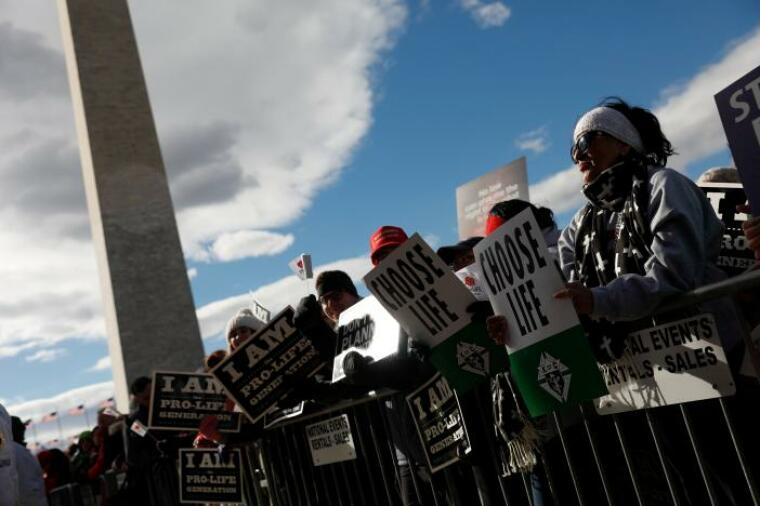Republican legislator introduces federal 'Sanctity of Human Life Act' in U.S. Congress

A Republican representative from Georgia has introduced a federal bill in the U.S. Congress declaring that life begins at conception.
Rep. Jody Hice presented House Resolution 586, also known as the "Sanctity of Human Life Act," just days before the 44th anniversary of Roe v. Wade, Christian News reported.
Hice, a former pastor of Bethlehem First Baptist Church and The Summit Church, said in a statement last week that the resolution recognizes the inalienable right to life outlined in the Declaration of Independence.
"Today, with the right to life under attack, now more than ever before, we must stand up as advocates for the unborn. Our culture must affirm the value of the weak and vulnerable in our society, beginning with our children," said Hice.
"With that in mind, I introduced the Sanctity of Human Life Act, which rightly defines life as beginning at conception." he continued.
The legislation also declares that Congress and each state has the right "to protect the lives of all human beings residing in its respective jurisdictions."
If passed, the legislation could make the "day after pill" as well as abortion illegal, according to Outlook Ohio.
Others have feared that the resolution would also affect the procedure known as in vitro fertilization (IVF). Critics were concerned that IVF would be criminalized if embryos created in a lab do not turn into successful pregnancies.
However, North Carolina congressman Robert Pittenger, who is co-sponsoring the legislation, gave his assurance that it would not affect IVF, as it is only a declaration, not a regulatory bill.
"It's certainly not a legislative bill. It just says that life begins at inception," he told Eyewitness News.
Other co-sponsors of the resolution include Reps. Barry Loudermilk (R-Ga.), Phil Roe, M.D. (R-Tenn.), Trent Franks (R-Ariz.), Jeff Duncan (R-S.C.), Bill Johnson (R-Ohio) and Blake Farenthold (R-Texas).
The bill has not been changed or voted on since it was introduced in Washington two weeks ago.
Similar measures have been proposed before, but opponents fear the bill has a greater chance of being signed into law with Republicans in control of the U.S. House of Representatives, Senate and the White House.
 Christians don't have to affirm transgenderism, but they can’t express that view at work: tribunal
Christians don't have to affirm transgenderism, but they can’t express that view at work: tribunal Archaeology discovery: Medieval Christian prayer beads found on Holy Island
Archaeology discovery: Medieval Christian prayer beads found on Holy Island Presbyterian Church in America votes to leave National Association of Evangelicals
Presbyterian Church in America votes to leave National Association of Evangelicals Over 50 killed in 'vile and satanic' attack at Nigerian church on Pentecost Sunday
Over 50 killed in 'vile and satanic' attack at Nigerian church on Pentecost Sunday Ukrainian Orthodox Church severs ties with Moscow over Patriarch Kirill's support for Putin's war
Ukrainian Orthodox Church severs ties with Moscow over Patriarch Kirill's support for Putin's war Islamic State kills 20 Nigerian Christians as revenge for US airstrike
Islamic State kills 20 Nigerian Christians as revenge for US airstrike Man who served 33 years in prison for murder leads inmates to Christ
Man who served 33 years in prison for murder leads inmates to Christ


 Nigerian student beaten to death, body burned over ‘blasphemous’ WhatsApp message
Nigerian student beaten to death, body burned over ‘blasphemous’ WhatsApp message 'A new low': World reacts after Hong Kong arrests 90-year-old Cardinal Joseph Zen
'A new low': World reacts after Hong Kong arrests 90-year-old Cardinal Joseph Zen Iran sentences Christian man to 10 years in prison for hosting house church worship gathering
Iran sentences Christian man to 10 years in prison for hosting house church worship gathering French Guyana: Pastor shot dead, church set on fire after meeting delegation of Evangelicals
French Guyana: Pastor shot dead, church set on fire after meeting delegation of Evangelicals ‘Talking Jesus’ report finds only 6% of UK adults identify as practicing Christians
‘Talking Jesus’ report finds only 6% of UK adults identify as practicing Christians Mission Eurasia ministry center blown up in Ukraine, hundreds of Bibles destroyed: 'God will provide'
Mission Eurasia ministry center blown up in Ukraine, hundreds of Bibles destroyed: 'God will provide' Church holds service for first time after ISIS desecrated it 8 years ago
Church holds service for first time after ISIS desecrated it 8 years ago Burger King apologizes for 'offensive campaign' using Jesus' words at the Last Supper
Burger King apologizes for 'offensive campaign' using Jesus' words at the Last Supper Uganda: Muslims abduct teacher, burn him inside mosque for praying in Christ’s name
Uganda: Muslims abduct teacher, burn him inside mosque for praying in Christ’s name